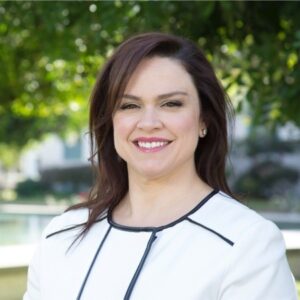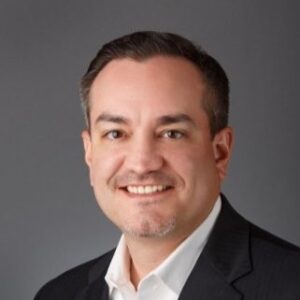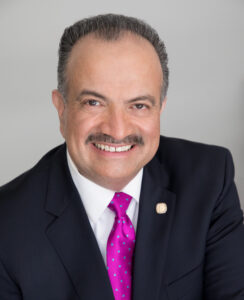
Education Leads the Way to a Stronger Economy – Panel Two Speakers
Pam Sornson, JD
October 17, 2023
The suggestion that education should be at the heart of economic development isn’t a novel idea. For years, experts have proven that countries with well-skilled workers enjoy stronger economies and a notable competitive advantage over nations that haven’t invested in their educational infrastructure. National, regional, and local economies all benefit when their shared workforce increases productivity, and even more so when those training and labor opportunities are available to all members of the population, regardless of their age, race, or gender. Communities that invest in a solid educational infrastructure experience lower poverty rates, better gender equality, and overall economic stability, which, together, reduce the social services burden on the government while enhancing the safety and security of the community at large.
Considering that sizeable impact of education on economic outcomes, it’s not surprising that the topic of choice for Panel Two at Pasadena City College’s 5th Annual Future of Work Conference is exploring “Innovations in Driving Student-Focused Systems Change.” While California’s community college system is already one of the best in the world, it also sees how new gaps and challenges stemming from recent economic upheavals render some of its programs obsolete. That divide between college and career is growing more prominent as industrial systems change while education systems remain stagnant. The LA region intends to fully recover from the pandemic and all its social, political, and economic fall-out, so it is dedicated to revising its education systems to facilitate those inevitable changes in how industries and economies ‘work.’

Clarifying Barriers
Accordingly, the second set of panelists on Conference day will discuss leveraging existing educational resources to meet emerging labor demands. There are numerous obstacles to forward movement on the issue, however:
The speed at which the pandemic dismantled many industrial norms surprised most people. In many cases, industrial sectors are still evaluating which internal system elements need revision, replacement, or retirement.
Some occupational categories will need complete overhauls, not just because of technological improvements but also because the workforce is shrinking. Innovators may have to learn to achieve more productivity with less human power to do the work.
The introduction of technology in almost every industrial sector often requires an entirely new set of skills, many of which weren’t even considered just five years ago. Many of today’s educational resources are not yet set up to offer these courses.
Clearly, there is much to discuss, and this set of panelists offers unique and advanced perspectives to enlighten all in attendance.
Panel Two Participants

Moderator: Salvatrice Cummo,
Vice President of Economic & Workforce Development, Pasadena City College
A long career in ‘business’ – family, non-profit, publicly traded – informs Ms. Cummo’s educational perspective. Having worked successfully in retail, she left that occupation to lead the Pasadena Small Business Development Corporation, where she and her team developed practices and tools to assist emerging companies in becoming more successful and profitable. She was named Director of Economic and Workforce Development for Pasadena City College in 2017 and was appointed Vice President in that role in 2021.

Dennis Rodriguez,
Director of Business Development, Black & Veatch
This century-old, employee-owned engineering/construction corporation prides itself on its commitment to solution-focused innovation. Mr. Rodriguez manages public sector business development for the Western United States. He brings his years of experience to the panel in LA’s political and business community, where he worked as an aide to LA city council members and as a leader in the LA Chamber of Commerce and the LA Neighborhood Initiative, among many other affiliations.

Kelly Mackey,
State Director of Strategic Apprenticeships, State of California Apprenticeship and Workforce Innovation Unit, CA Department of Industrial Relations
MacKey is a celebrated innovator in workforce development, having received the President’s Award from the American Society for Public Administration (ASPA) for her pioneering effort to build the country’s first public sector apprenticeship pathway. By doing so, she demonstrated that apprenticeships and work-based learning initiatives can evolve within all aspects of public life, including in government systems. Her insights will reveal how perceived obstacles don’t need to be barriers.

Dr. Francisco Rodriguez,
Chancellor, Los Angeles Community College District
As the leader of the country’s largest community college district, the LA Community College District (LACCD), Dr. Rodgriguez presides over nine colleges and 200,000+ students every year. These schools are often the first step for learners on their path to a better life, with half coming from low-income families. The District spends over $200 million per year in student aid, ensuring that every student has the resources needed to begin, persist through, and complete their early college education, whether that’s to pursue a trade or transfer to achieve a four-year degree. Dr. Rodriguez’s long history in both education and education administration provides him with insights and opinions that will surely educate FOW Conference attendees.

Nicole Feenstra,
Founder – The DNA Agency
A creative entrepreneur, Ms. Feestra uses her marketing and brand development skills to promote the high values of the trades as a career choice, most notably welding. A gifted storyteller, she knows how to connect an audience with her client’s resources with wit, charm, and precision. She will share her experiences developing marketing tools for trades-based educational programs with the panel and attendees.
The Conference is hosted by the Economic and Workforce Development Division at Pasadena City College (PCC EWD) and runs on October 26th, 8 am to 2 pm, in the Crevelling Lounge on campus. Attendance costs nothing, but registration is strongly encouraged.


